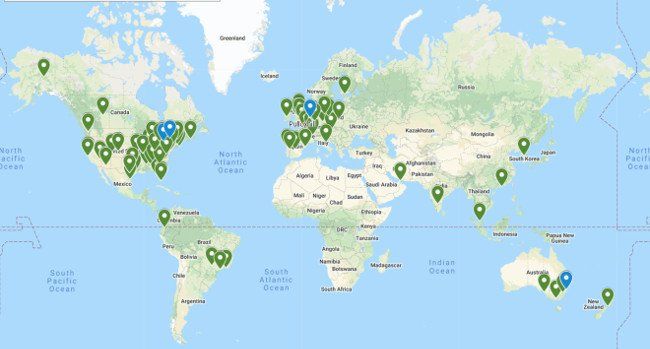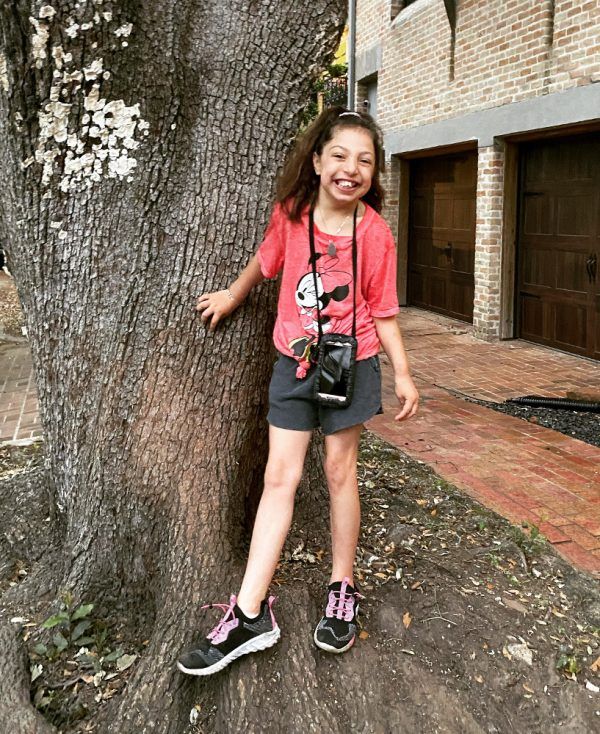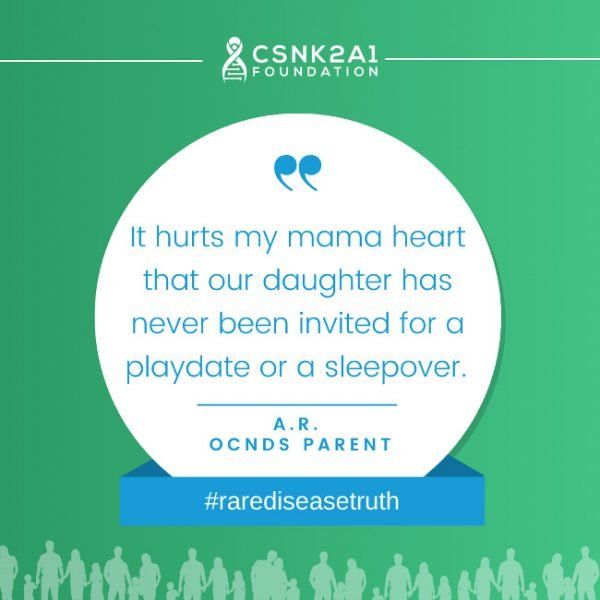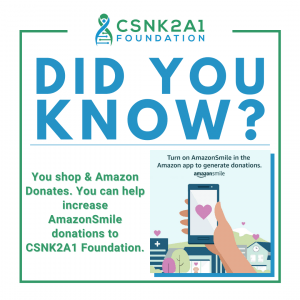Newsletter Q2 2021
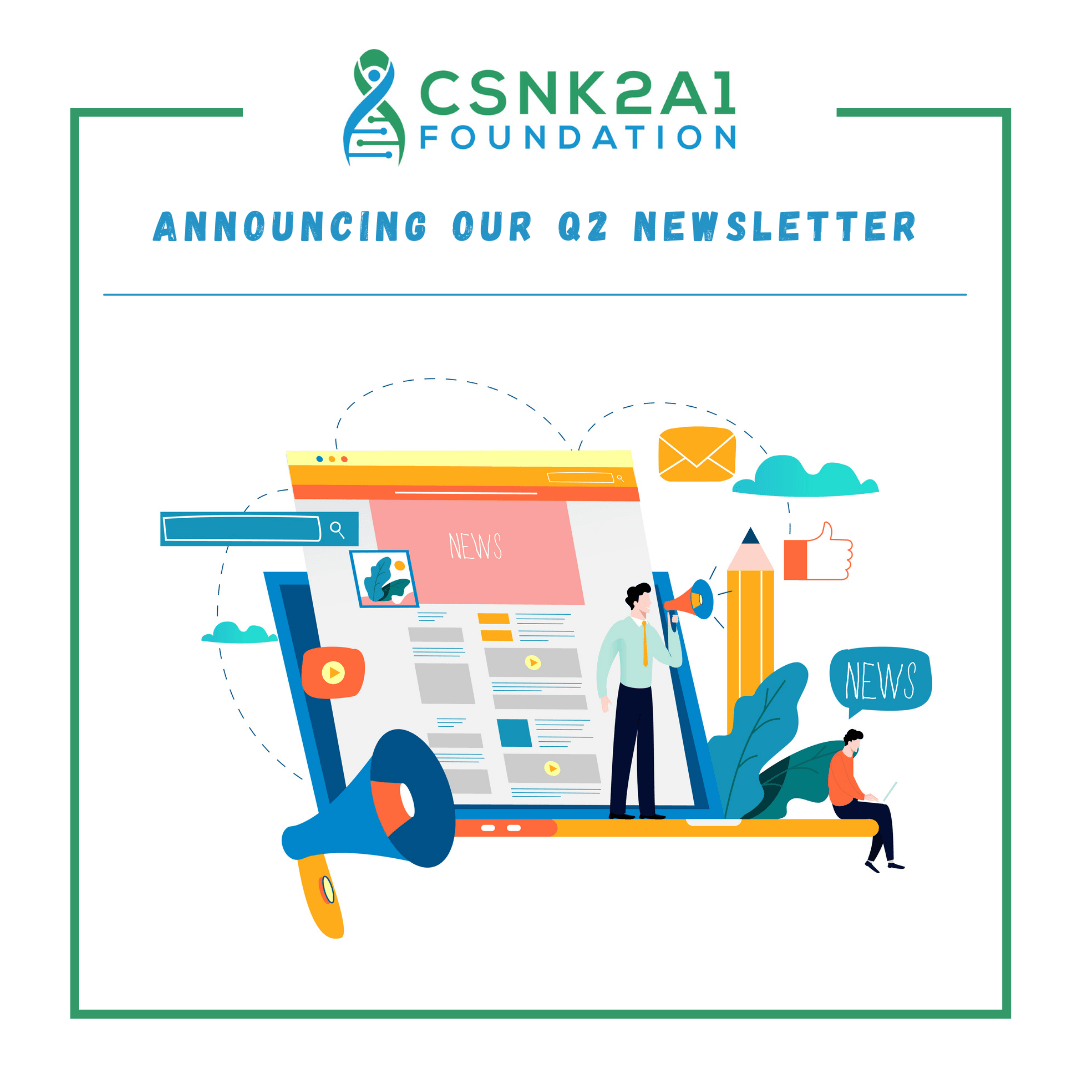
Q2 | June 2021
IN THE LOOP
CSNK2A1 Foundation Quarterly Newsletter
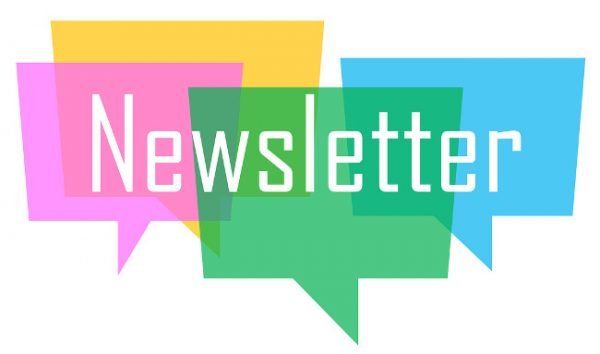
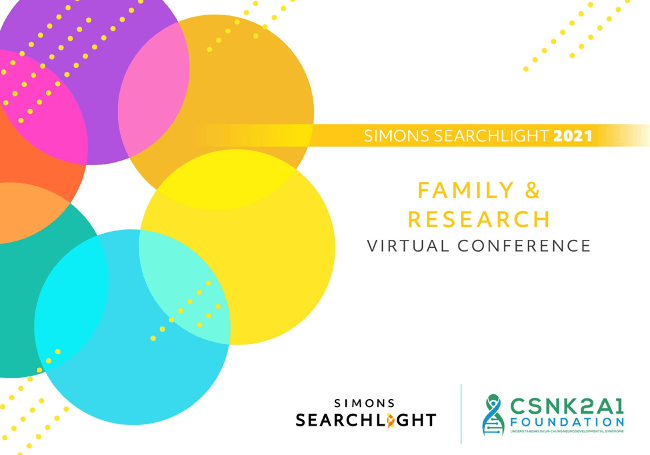
Check out the
agenda , register, and join us for the conference. Here’s what you can expect:
- Presentations for general sessions are based on a daily theme: Science & Medical on July 30, and Services & Therapies on August 6
- Plenty of time for Q&A throughout the conference
- CSNK2A1 presentations for sharing knowledge and having discussions
- Networking opportunities to connect with other families, researchers, and organizations
- Multi-language captioning (subtitles) for all presentations
Below is important registration information:
- Register here for the general session presentations on Friday, July 30 & August 6, 1:00 PM to 4:00 PM ET
- Register here for the CSNK2A1 presentations on Saturday, August 7 from 2:00 to 5:05 PM ET
Please NOTE, there are two different registrations...you must register separately for the general session and for the gene-specific conference. If you have any questions about the conference, you can reach out to Simons Searchlight at conference@simonssearchlight.org or to Jennifer Sills at jennifer@csnk2a1foundation.org
Number of Families Found Q2
In the second quarter of 2021, we found 16 new families spanning the globe. Thank you to our volunteer interpreters who helped us connect with some of the new families this quarter.
Needs Assessment Survey Results
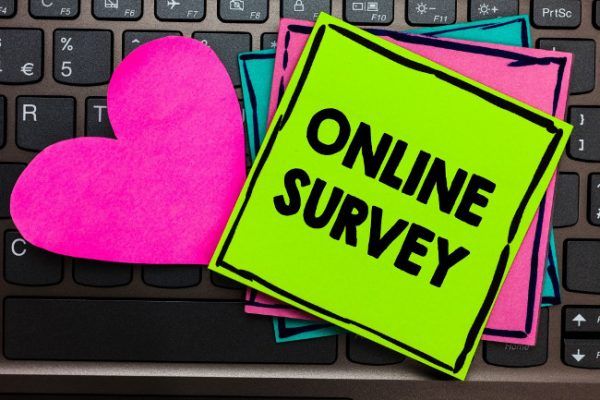
In February, our Parent Advisory Board conducted a Needs Assessment Survey to learn more about the needs of our OCNDS community (patients, caregivers, extended family). The survey consisted of 31 unique questions that collected both qualitative and quantitative information about OCNDS. Thank you to the 66 families who participated in the survey. Families from all over the world participated: 9 different languages were represented. The results of the survey informed our new brochure for OCNDS families developed by our Parent Advisory Board, which is available on our website.
We discovered that 83% of OCNDS families’ lives were negatively affected by Covid closures. A lack of services and social interaction, the challenges of home learning, and a lack of respite all led to a decline in mental health for many.
The most common OCNDS symptoms reported were speech delay, global development delay, learning disabilities/cognitive impairment, delayed motor skills, low muscle tone, short stature, sensory processing issues, dental problems, Autism Spectrum Disorder traits, constipation, vision issues, eating small amounts and ADHD.
The top reported concerns about people living with OCNDS right now are speech, independent living, toileting, education, fine and gross motor, self care/hygiene/sleep, behavioral, emotional and puberty. The overwhelming concern about the future was independent living followed by what will happen to our children when the parents are no longer alive.
We discovered that about 75% of participants have heard of Simons Searchlight OCNDS Natural History Study but only just over half of these families have actually participated. Many in our community do not know why participating in research is important and would like more information. We held a
webinar to address these concerns. We need you to represent yourself in the research. Please help us to improve these findings.
OCNDS/CSNK2A1 Foundation Brochure
Receiving an OCNDS diagnosis can be overwhelming and heartrending. Our Parent Advisory Board (PAB) understands how difficult it can be to navigate an OCNDS diagnosis. To help families on this journey, our PAB developed an OCNDS/CSNK2A1 Foundation brochure. This brochure can be shared with your family, friends, teachers, providers, and clinicians to learn more about OCNDS. Please view and share our new brochure far-and-wide. Thank you to our PAB for creating this helpful tool for our community. It will be available in multiple languages soon.
Featured Q2 Blog Post
EDUCATION
Research Explained

The scientific language in published research papers can be so complex you may feel like you need a PhD to understand what they are saying. To address this issue, in Q2, with the help of our researchers, we launched a new program called Research Explained. We ask researchers to explain their research in a language we can all understand. We believe we have a duty to make sure people affected by OCNDS and their families can easily understand their diagnosis and to empower them to be effective advocates. The more information we have, the more we can create a life for those living with OCNDS and their families that is vibrant, vital, and worthwhile. Thank you to the researchers participating in this program.
More specifically, thank you to Dr. Heike Rebholz for explaining foundation-funded research, “
Okur-Chung Neurodevelopmental Syndrome-linked CK2x variants have reduced kinase activity. ”
And thank you to Sarah C. Goetz. PhD and Abdelhalim Loukil. PhD for explaining “
A complex of distal appendage-associated kinases linked to human disease regulates ciliary trafficking and stability .”
Parent Education Webinar Series - Alternative Communication
In April, we hosted our quarterly Parent Education Series Webinar with Speak for Yourself, LLC about Alternative Communication. You can watch it here . The use of Augmentative-Alternative Communication (AAC) provides a “voice” and a means of communication to those who cannot rely on their natural speech to communicate. When children and adults cannot use speech to communicate effectively in all situations, there are options. Inability to speak or severe speech delay is one of the hallmark symptoms of OCNDS. Caregivers and parents are always looking for ways to ease the frustration of those living with OCNDS. Thank you to Jenny Matt, M.S., CCC-SLP, Nicole Trip, M.S., CCC-SLP, and Krista Kiernan, M.S., CCC-SLP for donating your time to educate our community.
Be on the lookout for details regarding our Q3 Parent Education Webinar.
AWARENESS
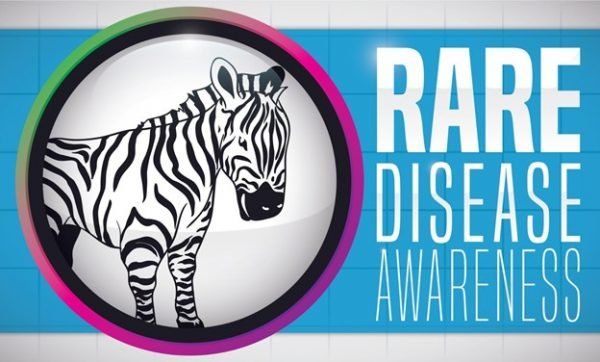
International OCNDS Awareness Day
April 5th was International OCNDS Day. We were touched by the overwhelming support our families received on this day. We loved receiving the pictures and videos of families and friends celebrating all over the world. Here are a few:
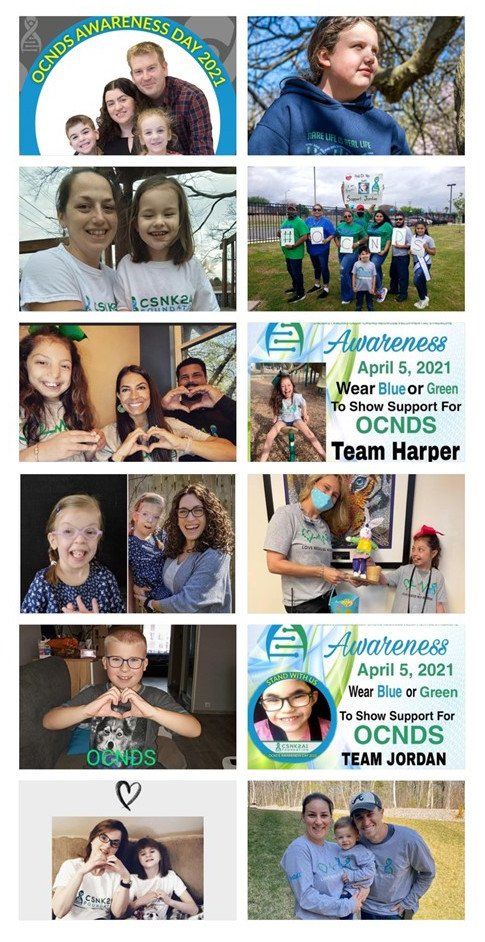
Thank you to our donors, supporters and friends for STANDING WITH US on OCNDS Awareness Day and making it a huge success by donating, sharing our content, and learning more about OCNDS.
#MilestoneMondays
Each Monday join us to celebrate
#MilestoneMondays . We highlight an individual living with OCNDS and celebrate a milestone that they have achieved. Those living with OCNDS have many daily challenges. Some challenges are as basic as swallowing, toileting, dressing themselves, putting on a seatbelt, and making friends. Individuals with OCNDS have to work harder than the average person to reach the smallest of milestones.
Today we celebrate Jules! Jules is 12 years old. Her parents describe her as a budding chef, spicy, clever, determined, and full of life. She has OCNDS and is non verbal. This past year, she started calling her dad, "dada." Most children reach this milestone in their first year. Jules' dad shared with us: "As the years passed, I thought Jules would never call me, dada. I've had many dreams where I hear her voice and she speaks. When Jules said dad for the first time, I thought I was dreaming. I love her voice. Every time she says dada I am reminded to never give up and never underestimate the amazing things she is capable of. Her body is failing her due to OCNDS, however she fights like crazy every day to reveal all the words and thoughts swirling in her clever brain. Dada loves you, Jules." Way to go, Jules!
#RareDiseaseTruth
The Jansen's Foundation started #RareDiseaseTruth . Rare disease truths - something often not talked about because we try to remain hopeful and positive. Every Thursday we are sharing truths from our community.
Thank you A.R., an OCNDS parent, for starting this conversation in our community and sharing your #RareDiseaseTruth. "It hurts my mama heart that our daughter has never been invited for a playdate or a sleepover. I am always inviting other kids over to our house so my daughter feels special. But I would love for her to be invited over for a playdate or sleepover for two reasons. One, most importantly, for my daughter to feel loved and special. Two, just to have a mama break of respite.”
#DidYouKnow
Did you know your shopping makes a difference? AmazonSmile is a simple way for you to support the CSNK2A1 Foundation every time you shop, at no cost to you. You can help increase AmazonSmile donations to CSNK2A1 Foundation by shopping at smile.amazon.com/ch/82-4220939 or with AmazonSmile ON in the Amazon Shopping app. Simply follow these instructions to turn on AmazonSmile and start generating donations.
- Open the Amazon Shopping app on your device
- Go into the main menu of the Amazon Shopping app and tap into 'Settings'
- Tap 'AmazonSmile' and follow the on-screen instructions to complete the process
Join us every Wednesday on our social media channels for our #DidYouKnow series.
RESEARCH UPDATES AND OPPORTUNITIES

Deletions in CSNK2A1
Dr. Okur and Dr. Chung are conducting a study on gene deletion (partial or whole gene) variants in OCNDS. If your child was found to have a deletion in the CSNK2A1 gene and if you are interested, you may contact Dr. Okur at vokur7@gmail.com to learn more about study details. If you are unsure if your child has a deletion on CSNK2A1 gene, please contact us at jennifer@csnk2a1foundation.org and we will help you read your genetic report.
Q2 Scientific Roundtable
CSNK2A1 Foundation hosts a quarterly Scientific Roundtable to bring together diverse researchers, clinicians, and innovators from around the globe to exchange ideas and accelerate the path towards treatment for OCNDS.
On April 13th, our Scientific Advisory Board and 2 board members hosted 7 institutions and 12 foundation-funded researchers to hear research updates and to discuss next steps. These roundtables play a vital role in setting our OCNDS research agenda. We were thrilled to hear how our researchers are successfully collaborating together. We are looking forward to our next roundtable on July 20th.
For information or inquiries about our Quarterly Scientific Roundtable, please email at
research@csnk2a1foundation.org .
Annual CSNK2A1 Scientific Conference
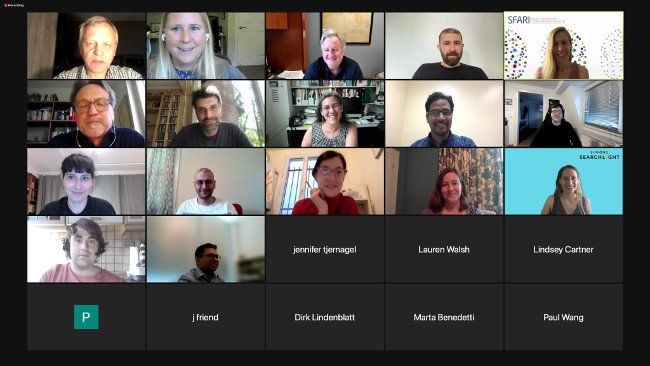
On May 27th, together with SFARI and Simons Searchlight, we hosted our CSNK2A1 Annual Scientific Conference. There were 28 researchers, clinicians and team members from across the globe sharing and collaborating to bring actionable results for our OCNDS community. Unfortunately, due to COVID restrictions, we were virtual again this year, however for 2022, we anticipate being in-person. Thank you to everyone for your efforts and contributions!
Simons Searchlight Research Opportunity

Simons Searchlight is led by scientists and doctors. They collect information to help learn more about rare genetic conditions. Over 2,800 people with rare conditions and their families are registered in Simons Searchlight, and more than 60 research papers have been published from their data.
If you have already done so, thank you for registering in Simons Searchlight and for uploading your genetic lab report. One of the most important next steps is to complete a
medical history interview.
So far, 27 OCNDS families have completed their medical history interview. It is an important step forward for research. Every person with OCNDS has unique symptoms and genetics, and more data are needed for scientists to study all aspects of the Condition.
The next step is to schedule a call for your medical history interview . During the call, you will talk with a genetic counselor about your experiences with OCNDS. This will help to make sure that you are fully represented in the research presented by Simons Searchlight. Families have found it easy to participate.
The medical history interview is a conversation about your child, of which you are the expert. You will be asked about medications your child is taking and if they have hearing or vision problems or seizures, for example. There are 2 ways to schedule your call.
- Go to your Simons Searchlight dashboard by logging into your account here. Select the ‘Schedule Medical History Phone Interview’ from your task list. or
- If you can’t remember your login information or you’re having trouble logging into your dashboard, you can email the Simons Searchlight coordinator to help you through the process at
coordinator@simonssearchlight.org
After completing the medical history interview and surveys, parents get an Amazon gift card for their time, as a way of saying thank you from Simons Searchlight. Gift cards can be redeemed at any time on your dashboard.
Simons Searchlight Sleep Survey
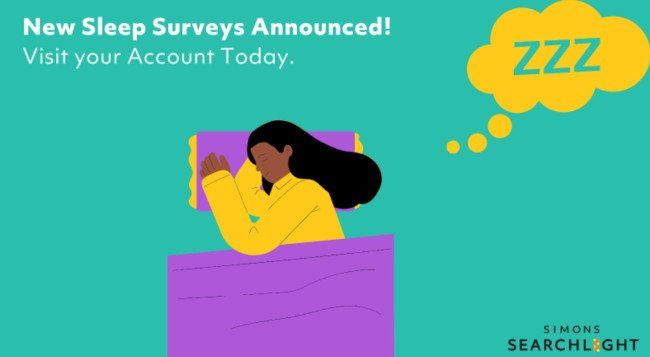
Sleep is a huge issue for most families in our community. For those signed up for Simons Searchlight, head over to your dashboard to complete the surveys on sleep for kids between the ages 2 - 18! If you haven't signed up for Simons Searchlight, do so today to be part of ongoing research!
Simons Searchlight Registry Infographic
Every quarter, Simons Searchlight publishes a quarterly registry report with updated data on Simons Searchlight CSNK2A1 participants, click HERE. If you want to be included in future reports, join Simons Searchlight today ! Data presented in this report is primarily gathered from the medical history phone call.
New Publications in Q2
To date, there have been 14 papers published on OCNDS. There were 3 new OCNDS research papers published in Q2.
Read them here and share them with your providers. Don’t forget to visit our
Research Explained page.
FAMILIES CONNECTING
Finding a community can make all the difference in a rare disease journey. During these unprecedented times of COVID, it is even more important to stay connected. To keep our families connected, our Parent Advisory Board hosts Zoom calls to discuss a variety of topics ranging from epilepsy management to puberty to transitioning into adulthood. Recently, we shifted from quarterly to monthly family calls. These calls serve as a lifeline for many families struggling with basic daily activities. We also have families meeting up via region or country through What’s App or Facebook Messenger to talk more specifically about issues that are specific to their geographic area. If you haven’t joined our smaller What’s App or Messenger groups, please contact Jennifer at jennifer@csnk2a1foundation.org and we can direct you to the appropriate group.
Language can be a barrier to participation in everything related to rare disease (e.g., doctor’s appointments, research, therapies, school, and connecting with other families). To increase our global participation, we have invested in AI technology that will allow our families throughout the globe to meaningfully participate in our monthly family Zoom calls without the need of a live translator. This is a big deal for us because we have 9 different languages represented in our OCNDS community. We are excited to see how this AI platform can help our families connect and be more informed. Thank you to our donors who make programs like these possible, ensuring our entire community’s voice is heard.
1st Australian Family Zoom Meet-up April 15, 2021
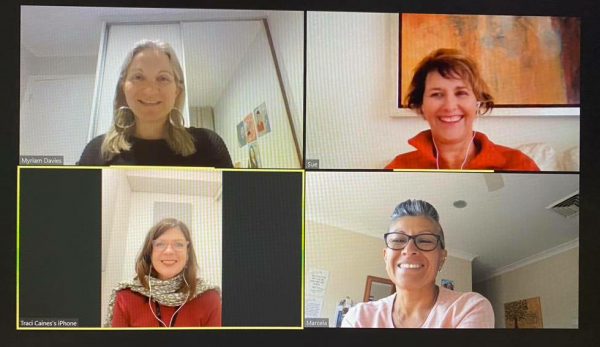
CSNK2A1/OCNDS Family Call on Early Intervention & Entering School Age May 15, 2021
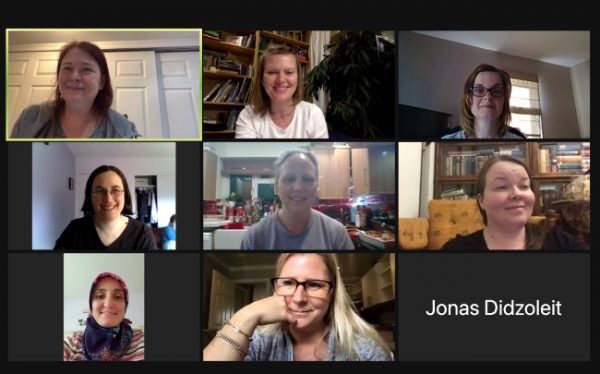
1st UK Family Zoom Meet-Up May 16, 2021
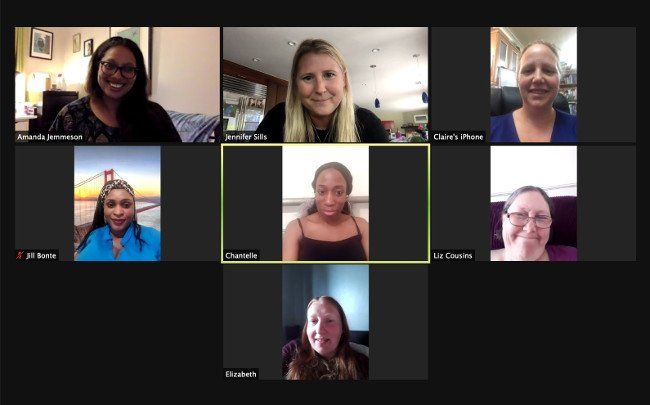
1st Canadian Family Zoom Meet-Up
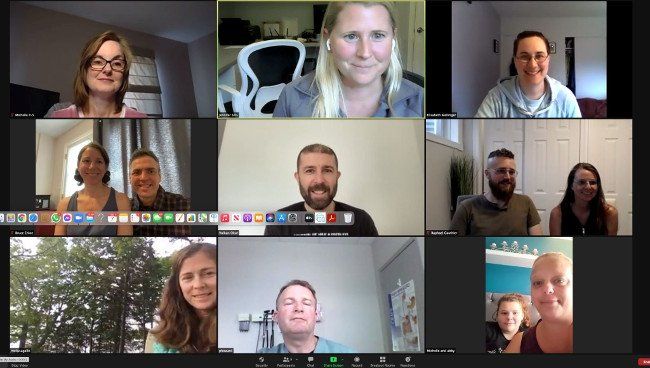
MARK YOUR CALENDAR
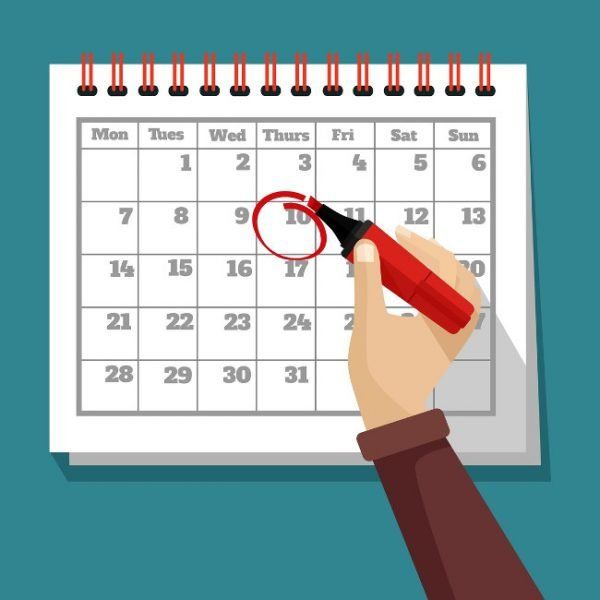
Q3 Quarterly Scientific Roundtable
July 20
Virtual Conference
General session presentations on Friday, July 30 & August 6 CSNK2A1 presentations on Saturday, August 7
Monthly OCNDS Family Zoom Calls
July 9 August 28 September 25
Save the date - Virtual Fun Run, Walk or Roll Fundraiser
October 9 & 10
HOW TO GET INVOLVED
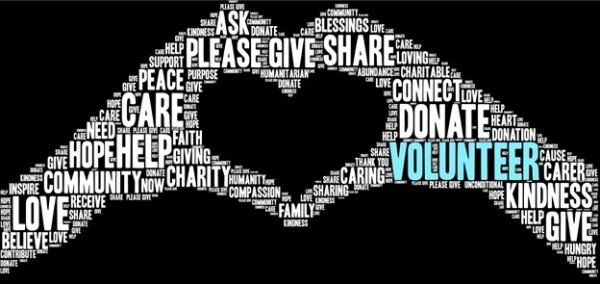
As you are navigating this diagnosis, there are steps you can take to get informed, connected and to make an impact today!
Have special skills or talents and would like to donate your time? There are many volunteer opportunities available at the Foundation. Email us at
volunteer@csnk2a1foundation.org to get involved.
Help us bring awareness to OCNDS by sharing our content across social media. One easy way to get involved is to “like” our
Facebook page and ask your friends to “like'' our page. Follow us on
Twitter ,
Instagram , and
Linkedin .
Friends, family and providers can join our closed Facebook group to share ideas and learn more about OCNDS.
Join now .

